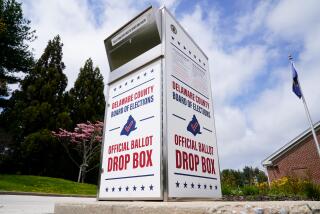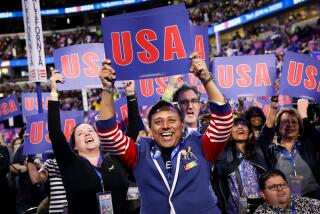Shepard Fairey explains his ‘We the People’ inauguration protest posters
We are all equally American. That’s the message artist Shepard Fairey and others are hammering home with a campaign titled “We the People,” which calls for posters printed in newspapers to be used as protest art Friday at inauguration demonstrations.
In an interview with The Times, Fairey said his imagery — Latina, Muslim and African American women rendered in the same red, white and blue that made his “Hope” election posters for Barack Obama famous — was a pointed reference to people who have felt attacked by President-elect Donald Trump.
READ MORE: Inauguration Day live updates »
The nonprofit Amplifier Foundation, which defines its mission as “amplifying the voices of grassroots movements through art and community engagement,” commissioned the works by Fairey. The foundation also led a successful Kickstarter campaign to pay for the artwork to be placed as paid advertising in the Washington Post, the New York Times and USA Today. The goal, organizers said: to reclaim “American values and identity.”
“We felt the phrase ‘We the People’ is pretty important. It means everyone,” Fairey said, adding that they wanted the posters to convey “the idea of the melting pot and inclusion.”
We felt the phrase ‘We the People’ is pretty important. It means everyone
— Shepard Fairey
For Fairey and for Ernesto Yerena and Jessica Sabogal, two others who created “We the People” posters, art reproduced as full-page newspaper ads turned out to be a novel hack for distributing a message widely. (The images are also available to download online for free.) The official presidential inauguration website says large banners will not be allowed at public inauguration events, but the newspaper posters fall within size requirements.
“It’s a 12-by-22 spread, so you can take it out of the newspaper and hold it up,” Fairey said Thursday, adding that the campaign also planned to drop art materials out of the back of moving vans at yet-to-be disclosed locations in Washington.
Free speech, Fairey said, can’t be contained.
“This whole idea of sanitizing in order to put across a certain image from one perspective is very disturbing,” he said.
Amplifier’s Kickstarter campaign sought to raise $60,000, but to date it has raised more than $1.3 million. Kickstarter doesn’t distribute funds for a month, so Fairey used his own money to finance the project until Kickstarter funds become available. “We the People” ads in the three newspapers cost $276,000, organizers said. The remaining money will be used to distribute fresh images that highlight groups and causes that the incoming administration has marginalized, Fairey said, citing women’s reproductive rights and the LGBT community.
The campaign is printing 8,000 posters for the planned Women’s March in Los Angeles on Saturday and even more for its counterpart in Washington, although Fairey said he was not sure of the number. Banners measuring 24 feet high and 18 feet wide are being created for the L.A. march as well.
“Last year was a tough year. There were a lot of divisions and fear mongering in the rhetoric,” Fairey said. “Things like this give people a platform to say, ‘I resist fear and exclusion.’ It makes it easier for people who are afraid to express their point of view because they think they are out of step with the dominant ideology.”
Fairey said his “Hope” posters and the “We the People” posters are driven by the same impulse: to provide encouragement to those who feel powerless and deflated.
“I’m still very proud of the work I did on the ‘Hope’ campaign. Those values carry on,” he said, adding: “Whether you’re Muslim, Latino or black, we’re all Americans. I want this campaign to be about us seeing ourselves in each other and feeling a connection to one another.”
Twitter: @jessicagelt
ALSO:
President Trump will be a boon and a challenge for the cable news business
Inauguration gig boosts Jackie Evancho’s concert ticket sales
More to Read
The biggest entertainment stories
Get our big stories about Hollywood, film, television, music, arts, culture and more right in your inbox as soon as they publish.
You may occasionally receive promotional content from the Los Angeles Times.











